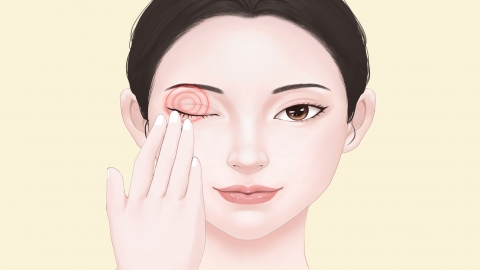What to do about loose skin and wrinkles on the lower eyelid
Under normal circumstances, loose lower eyelids and wrinkles may be caused by factors such as aging and collagen loss, prolonged熬夜 and eye strain, periorbital eczema, blepharochalasis, or hypothyroidism. It is recommended to seek medical attention promptly, identify the underlying cause, and then improve the condition under a doctor's guidance through general care, medication, or surgical treatment. Specific analyses are as follows:

1. Aging and collagen loss: With age, collagen and elastic fibers in the skin of the lower eyelid decrease, causing the skin to lose support, become loose, and gradually develop wrinkles. Daily use of eye creams containing vitamin E or retinol, gently applied and massaged around the eyes morning and evening, can promote blood circulation.
2. Prolonged熬夜 and eye strain:熬夜 impairs blood circulation around the eyes, while frequent screen exposure causes tension in the periorbital muscles, worsening skin laxity and wrinkle formation. Adjust sleep schedules to ensure 7–8 hours of sleep each night; rest for 5–10 minutes every 40 minutes of screen use, perform eye exercises to relax the eye muscles, and reduce熬夜 and screen time.
3. Periorbital eczema: Irritation or allergic reactions can trigger eczema on the skin around the eyes. Repeated scratching and inflammation damage the skin structure, leading to looseness and wrinkles. Avoid known allergens, follow medical advice when using medications such as hydrocortisone butyrate cream, tacrolimus ointment, or loratadine tablets, keep the periorbital area clean, and avoid scratching.
4. Blepharochalasis: Congenital abnormalities or acquired damage to elastic fibers in the eyelid skin result in loose, drooping skin and increased wrinkling. Mild cases may benefit from radiofrequency therapy to stimulate collagen regeneration, while severe cases may require blepharoplasty to remove excess loose skin and restore eyelid appearance.
5. Hypothyroidism: Insufficient thyroid hormone secretion slows metabolism and causes mucinous edema in the skin. Over time, this can lead to loose lower eyelid skin and wrinkles, accompanied by fatigue and cold intolerance. Follow medical guidance in taking medications such as levothyroxine sodium tablets, thyroid extract tablets, or Jin Kui Shen Qi Wan to regulate thyroid function and improve skin condition.
In daily life, increase intake of collagen-rich foods such as pig trotters and fish, and consume fruits and vegetables high in vitamin C to support collagen synthesis. Avoid rubbing the lower eyelids vigorously and minimize mechanical pulling on the skin. Comprehensive skincare measures can help delay the progression of lower eyelid laxity and wrinkles, maintaining healthy periorbital skin.






